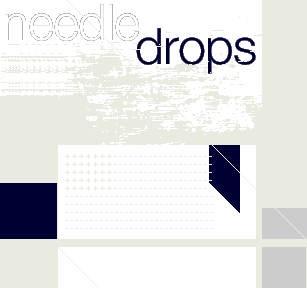


++ Contact Philip Sherburne ++
++ Recently ++
Tuesday, November 29, 2005 = The Stooges Unearthed (Again)
Tuesday, November 8, 2005 = Documenting Beulah And DCFC
Tuesday, November 1, 2005 = Out-Of-Control Rock 'N' Roll Is Alive And Well
Tuesday, October 25, 2005 = Just In Time For Halloween
Monday, October 3, 2005 = The Dandyesque Raunch Of Louis XI
Monday, August 15, 2005 = The Empire Blues
Tuesday, August 9, 2005 = David Howie's Sónar Diary
Monday, July 25, 2005 = Hot Sounds For Summertime
Monday, June 27, 2005 = Overcoming Writer's Block At Sónar 2005
Monday, June 4, 2005 = Cool New Sounds To Download Or Stream
++ Needle Drops Archives ++
View full list of Needle Drops articles...
|
|
 |
Monday, September 16, 2002
++ Slowing Things Down
++ Sometimes you've just gotta slow it down.
Don't get me wrong: I love to play the uptempo gear: bumpin' house, pumpin' techno. Tracks that barrel on through and brook no stragglers. But for a few months now, I've found these weird tracks creeping into my sets — mid-tempo groovers that drag like underwater runners with leg-weights on.
The first few frustrated me no end, simply because I couldn't find anything to play them with. I:Cube's remix of Ana Rago's "You're God" struck me, when I first heard it, as one of the deepest house tracks I'd ever heard — except that even at +8 it was still way too slow to mix into even the most sluggish of Moodymann cuts. What to do with it? Gradually, though, I started finding odd complements — Neneh Cherry's bizarre funk/punk single with Raw Sex, "Stop the War." The dub of Thomas Dolby's "Dissidents" (don't laugh). Every few weeks I'd find another half-speed bastard in the bins somewhere, and that Sunday my set would grow by one. And then I found Metro Area's "Piña."
Classic re-released the track, originally on 1999's Metro Area 1, late last year; it'll also be coming out on the Environ/Source two-LP reissue of the choicest cuts from Metro Area's four singles. Which is good news for anyone who missed it the first time, because it's one of the deepest dance-floor tracks to come out in years. Opening with a warped bell tone and a few muted finger-snaps, it quickly staggers into a drunken salsa cadence, playing lilting acoustic guitar lines off wilting piano chords, while a rickety hi-hat riff tills the bleak soil from which all this strange, withered ivy rises. But the track's most striking characteristic might be its tempo: it shuffles along like the occupants of an old folks' home, but the internal rhythms are as sprightly as Gene Kelly's lamppost loop-de-loops. These rhythms warp the rhythmic grid: I imagine pool balls knocking each element into the next measure, reconfiguring the empty space on the table with every bar. "Piña" was the track I'd been looking for, the centerpiece of my mid-tempo set.
++ Thomas Brinkmann has lamented that some of the spirit has gone out of contemporary dance music. "Sometimes I think the whole thing" — dance music, that is — "has become a little too much like sport," he told me earlier this year. "All the dance clubs are more like gymnasiums. There's not the same kind of funkiness there was 30 years ago, when people were content to play a lot slower."
Brinkmann remembered the impact that tempo had on the crowds at Soul Center, a German discotheque he visited in the 1970s (and from which he cribbed his primary alias). Frequented by American soldiers, it was one of the only places to hear funk and soul in those days. He remembers hearing the Bar Kays at 80 BPM. "I loved the groove, and how people used to dance — often it was really slow, slow, slow. People danced really close."
"Piña" spins at about 108 BPM, but it's the same idea: too slow for comfort, but so, so right nonetheless. Morgan Geist and Darshan Jesrani, the two producers behind Metro Area, laugh when I call attention to the track's tempo.
"That tempo is, I don't know, man — it's nice because there's a lot of space," said Geist, talking on the phone from Brooklyn. (Jesrani was on the line too, dialed in from Manhattan.) "I mean, 108 in particular, I don't know what we've done there, but we don't usually take it up too high. I think it's because when there's more space in the measures you can sort of let things stretch out and we can sort of indulge.... I don't know, I was going to get into all this producer nonsense, but it's sort of like, it feels good to listen to.
"It's weird," he continued, "because the first time I experienced slower stuff, it would catch me by surprise, like I'd be listening to mixes on NY radio and I'd be loving the stuff they were playing, and then I'd realize, it's so slow! There's so much energy there, and it's sort of this subtle energy, because it focuses you a little bit. I've noticed that it takes people a little bit longer to get into it, because there's not this immediate, in your face, uptempo, banging-bass-drum sort of thing. But the final product's a little better if it takes a little longer to get into."
"It is sort of an intense tempo," Jesrani chimed in, and he's right. You can see it in the dancers when you play it out, in the way their bodies stiffen and then relax, in the way they grab at each other. "I feel like the atmosphere has to stew a little bit first, and then it gets a little more concentrated," said Geist. "As opposed to just the obvious, unfocused 'this is where we dance.' Again, a lot of the records we love, that are really moving, all of a sudden it's like wow, this is slow. Like, you don't realize it."
We're rolling now, totally in the groove of our own conversation, geeking out on tempo. "It's like the old boogie tempo, which is usually less than 120," said Jesrani, jumping in. "It is an intense tempo, because if you start playing a set of records like that, you sort of wanna hear that, and keep hearing that, and it's a little hard to get out of, almost." I know what he's talking about. I've been tempted to play sets twice through, just to keep that groove going. It gets into your blood. It's like breathing. Switching up the beat comes to feel almost unnatural.
"It's funny," Geist said, "because we've had our little geek conversations about internal tempos, like Danny Wang and I used to talk about it, and Darshan and I talk about it — where you can have a slow song that feels fast because of how things are interacting in the measures, or what beats are being emphasized. It sounds really fa-fa, chin-scratchy, but it's not, it's just the most basic thing. Because you can have this really rocky beat and it sounds draggy and incredibly boring, and then we'll be spinning and Darshan will put this record on that's just like, insane, and the whole room will just like — you can just feel the energy go up, but it's a really slow track. You can sort of trick people into thinking there's more energy, or that things are moving faster than they are."
Jesrani cut him off. "We're so — I don't know if this is a modern thing, but people are used to thinking about energy in terms of speed. Like, oh, play faster!" Morgan aped a German accent: "'Now is where you put on the pressure,'" then laughed. "When we first started playing in Europe, we'd get that a lot. And people are sort of like, oh, this is chillout." The incredulity thickened in his voice. "No, it's not!"
And he's right, it's not chillout, not at all. "Piña" is wound as tightly as a watch spring, and it uncurls slowly, with impeccable control. You want pressure? That's pressure.
|
| |
|